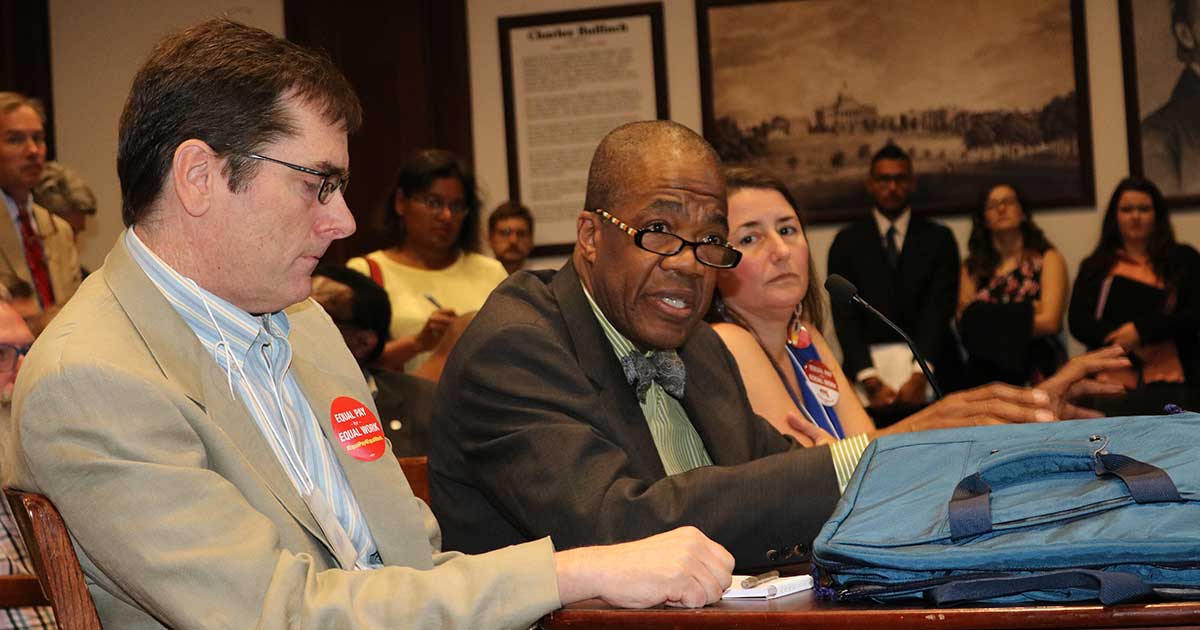Two bills focus on ending exploitation of adjuncts
Two bills focus on ending exploitation of adjuncts

The contributions that adjunct faculty members make to higher education are enormous, but the compensation they receive in doing so is pitiful.
That was the message delivered to the Legislature’s Joint Committee on Higher Education on Thursday, June 29, when it heard testimony on two House bills — 639 and 2236 — that seek to improve working conditions for adjunct instructors working on public and private campuses.
For the hearing, members of the MTA who teach at community colleges, state universities and in the UMass system teamed up with colleagues who belong to the United Auto Workers, which represents adjuncts at the University of Massachusetts in Lowell, and SEIU Local 509, which organized adjuncts who teach at various private institutions in the Boston area.
“We are paid poverty wages to do important work,” said Michele Nash, who has been teaching at Springfield Technical Community College for 18 years yet earns a fraction of what a full-time faculty member earns. She has no access to benefits such as health insurance and a retirement plan.
The MTA is backing H. 639, An Act investing in public higher education.
Sponsored by Senator Eileen Donoghue (D- Lowell) and Representative Paul Mark (D-Peru), the bill seeks to establish pay parity between adjunct and full-time faculty. It provides pathways for adjuncts to obtain health insurance and retirement benefits, and it calls for more tenure-track faculty to be hired on campuses.
The bill would also establish a Finish Line Grant for students, which would cover the cost of tuition and fees for one year at a public college or university. The bill currently has more than 100 co-sponsors.
Faculty members from private colleges and universities attended the hearing to advocate for H. 2236, An Act to ensure minimum fair wages and employment stability for adjunct faculty, which also seeks wage parity and other workplace improvements.
MTA President Barbara Madeloni said that the exploitation of adjuncts undermines the mission of higher education.

After listing the inequities adjunct faculty face in terms of low pay, a lack of access to benefits and uncertainty about course assignments, Madeloni said, “That impacts their capacity to live up to their knowledge and expertise. You can’t do the work that needs to be done when you’re insecure in your job, insecure in your housing and insecure in having health insurance.”
Madeloni said House 639 would “create a stable environment for our faculty and students.”
University of Massachusetts Amherst student Kenny Fairney illustrated the situation for the legislative panel when he described how he works closely with the professors in his field of study, all of whom happen to be full-time tenure- track professors.
“I’ve been lucky because I’ve created crucial connections with my professors. When professors have to move among many campuses, that makes it harder to have the type of student-faculty relationships I have experienced,” he said.
Another clear message that emerged during the hearing was that adjunct faculty members are dedicated to teaching despite their working conditions.
“Teaching is my life,” said Walter Harper, an adjunct professor at Bridgewater State University.
Harper explained that despite his 35 years of teaching experience and several degrees, he still earns only $4,000 for a typical three-credit course. He has no access to health insurance or a state pension plan.
“House Bill 639 would address the adjunctificaction of higher education,” he said. “Passage of this bill is crucial for the education of our students and for the adjunct faculty.”
The Joint Committee on Higher Education is scheduled to hold another hearing on July 13 to hear testimony on H. 639’s provision for Finish Line Grants.